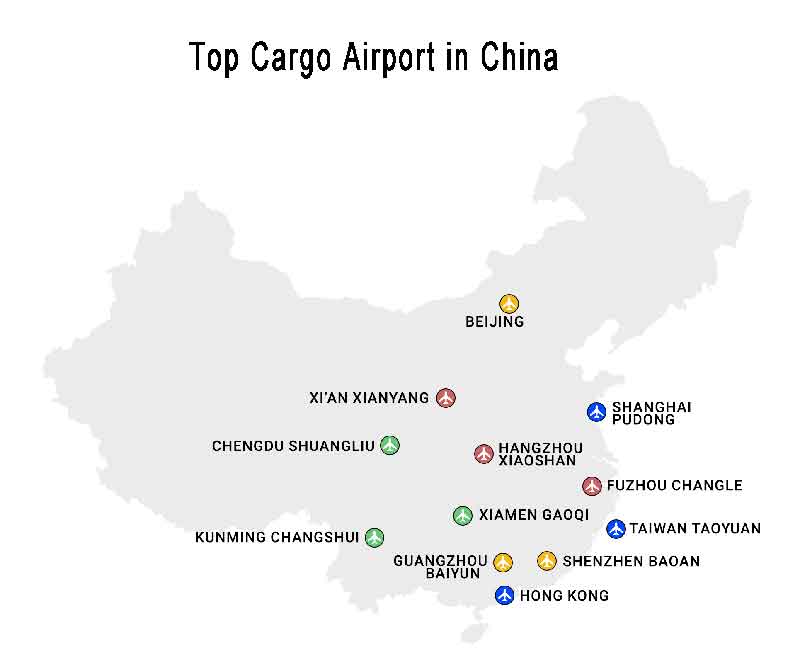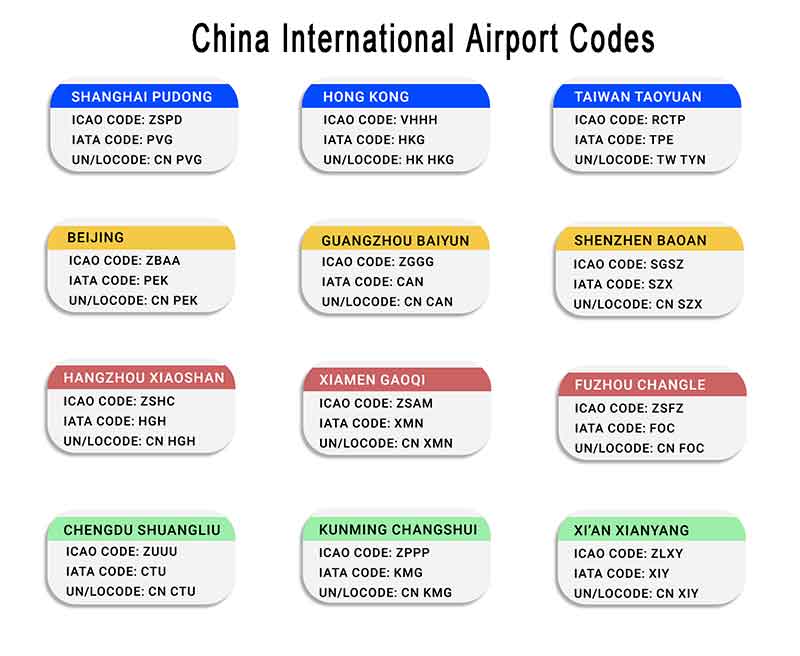Shipping goods quickly and efficiently from China often means turning to airfreight, the fastest transportation option. As one of the global manufacturing hubs, China’s international cargo airports are expanding and modernizing to ensure faster deliveries and smoother logistics. Below, we explore some of the most important airports in China that are transforming global trade.
Table of Contents:
- Hong Kong International Airport
- Shanghai Pudong International Airport
- Guangzhou Baiyun International
- Shenzhen International
- Beijing Capital International
- Taiwan Taoyuan International Airport
- Hangzhou Xiaoshan International Airport
- Xiamen Gaoqi International Airport
- Chengdu Shuangliu International Airport
- Kunming Changshui International Airport
- Xi’an Xianyang International Airport
- Find Air Forwarding Experts
Hong Kong International Airport
Hong Kong International Airport (HKG) has consistently held its position as the world’s top cargo hub since 2010, except for a brief pause in 2020. Serving as a vital transshipment and gateway hub, it connects China to international markets across the globe.
Cargo volumes and key shipments
In 2021, HKG processed an impressive 5 million metric tons of air cargo, nearly double the total handled by all airports on the African continent. Key imports include integrated circuits, broadcasting equipment, computers, telephones, and gold. On the export side, HKG is renowned for handling diamonds, electronics, batteries, and other precious materials.
Cargo airline and freight service providers
With around 100 airlines operating at HKG, the airport connects to 180 destinations worldwide. It is a hub for major carriers such as Hong Kong Airlines, Oneworld Alliance Airlines, HK Express, and China Eastern Airlines.
Leading cargo providers like DHL Aviation, UPS Airlines Air France Cargo, Lufthansa Cargo, and Qatar Airways Cargo also operate extensively here. Furthermore, Singapore Airlines and Ethiopian Airlines use Hong Kong International Airport as a key stopover point.
Strategic location and connectivity
Strategically located just 26.5 km from Victoria Harbour—home to Hong Kong’s primary seaports, which handle 220,000 ships annually. Nearby airports include Macau International Airport (49 km), Zhuhai Airport (57 km), and Guangzhou Baiyun International Airport (126 km).
HKG’s success lies in its strategic location, excellent connectivity, modern infrastructure, and high capacity for cargo handling. Its efficiency and commitment to safety make it a preferred choice for global trade, ensuring smooth and reliable logistics for businesses worldwide.
Shanghai Pudong International Airport
Located 30 km from downtown Shanghai, Pudong International Airport (PVG) is a critical aviation hub in East Asia and one of the top international airports in China. It plays a vital role in facilitating global trade and cargo movement.
Cargo volumes and key shipments
PVG handles an impressive 3 to 4 million tons of cargo annually, making it a cornerstone in China’s logistics network. Top exports include refined petroleum, tea, petroleum gas, and cotton.
Cargo airline and freight service providers
PVG hosts a range of prominent cargo airlines, such as Emirates, China Airlines, China Southern, Korean Air Lines, and Silkway West. In addition, global operators like DHL Aviation, FedEx Express, Lufthansa Cargo, and UPS Airlines further strengthened forwarding services. Local providers, including Airsupply Logistics, offer essential services such as customs clearance to streamline the shipping process.
Strategic location and connectivity
The Port of Shanghai, one of Asia’s key trade hubs, is 63 km from Shanghai Pudong International Airport. Export goods passing through this port account for a quarter of China’s total foreign trade value. Additionally, Shanghai Hongqiao International Airport (SHA) is only 12 km away, providing complementary regional and international connectivity services.

Guangzhou Baiyun International
The airport, identified by its international code CAN, is one of southern China’s busiest and most significant cargo hubs.
Cargo volumes
According to ACI’s 2021 report, CAN managed over 2 million tons of air cargo, consistently ranking among the top cargo airports in China.
Cargo airline carriers
The airport is a key operational base for major carriers such as Air France Cargo, Korean Air Cargo, Lufthansa Cargo, and UPS. Notably, it serves as a regional hub for FedEx in Asia-Pacific, supporting 136 weekly flights since its establishment.
Proximity to seaports and airports
Situated 42.6 km from the Port of Guangzhou Huangpu, CAN offers seamless connectivity for goods moving by road or sea. Foshan Shadi Airport, another regional airport, is just 57.6 km away, further enhancing logistical options.
Guangzhou Baiyun International combines strategic location, robust airline services, and efficient infrastructure, making it a preferred choice for businesses seeking reliable airfreight solutions in southern China.
Shenzhen International
Shenzhen Bao’an International Airport (SZX), opened in 1991, is another cargo hub in southern China, primarily serving Shenzhen and Guangdong Province. It is one of the three main airports supporting the Pearl River Delta, a key region for global trade.
Cargo volumes and global reach
SZX handles over 1.5 million tons of cargo annually, connecting to 46 destinations via more than 39 cargo routes. Goods depart from there to major cities across Asia, Africa, Europe, and the United States.
Nearby other cargo ports
Bordering Hong Kong and its special administrative territories, Shenzhen Bao’an is crucial in complementing cargo services across the Canton region. Its strategic location enhances its ability to handle high-volume shipments efficiently.
Major carriers and service providers
SZX is a hub for China Southern Airlines, SF Airlines, and Hainan Airlines. It also supports UPS’s Asia-Pacific operations and hosts global freight companies like China Cargo Airlines and FedEx Express.
Advanced logistics infrastructure
The airport’s logistics center spans 115,000 square meters, offering comprehensive services such as customs storage, international distribution, customs clearance, and door-to-door delivery.
We at Airsupply can help you create customized shipping routes based on your location and find the nearest airport to help reduce costs.
Beijing Capital International
Beijing Capital International Airport (PEK), the primary aviation hub of China’s capital, features an extensive cargo terminal and four hangars. As a 4F-rated facility, it accommodates wide-body aircraft.
Cargo volumes and key cargo
Handling over 120,000 metric tons of cargo annually, PEK has come a long way from the modest 34,000 tons it managed 40 years ago. Its primary imports include natural gas, iron ore, and American soybeans, while exports focus on electronics, textiles, and medical goods.
Airline and freight services
With freight operations supported by more than 100 airlines globally, PEK ensures robust connectivity. Leading logistics providers such as Air China Cargo, DHL Aviation, FedEx Express, and Lufthansa Cargo are key players at this airport.
Taiwan Taoyuan International Airport
Located 40 km from Taipei in Dayuan District, Taiwan Taoyuan International Airport (TPE) is Taiwan’s busiest and largest airport. Managed by the Taoyuan International Airport Corporation, it is a critical cargo transshipment hub in the region and a vital gateway to destinations across Asia.
Cargo volumes and key exports
On average, TPE handles over 2.34 million metric tons of international air freight annually. The airport plays a central role in the export of high-value commodities, including semiconductors, automobiles and auto parts, flat panel displays, steel, and electronics.
Proximity to other airports
Taipei Songshan Airport, located 27 km away, provides additional connectivity, complementing TPE’s extensive reach within Asia and beyond.
Hangzhou Xiaoshan International Airport
Hangzhou Xiaoshan (HGH), located 27 km from downtown Hangzhou, is the main airport gateway to Zhejiang Province’s capital. It provides extensive domestic connections and international flights to destinations across Europe, East and Southeast Asia, South Asia, etc.
Major airline carriers
HGH is a strategic hub for several prominent airlines, including China Southern Cargo, Air China Cargo, SF Airlines, and more, facilitating efficient cargo transport across a wide network.
Nearby airports
The airport’s proximity to major transportation hubs further enhances its logistics potential. Nearby airports include Ningbo Lishe (136 km), Shanghai Hongqiao (151 km), and Shanghai Pudong (184 km).
Cargo handling
With annual cargo volumes surpassing 1 million metric tons, HGH has experienced significant growth.
Xiamen Gaoqi International Airport
Xiamen Gaoqi Airport (XMN) is on the northern side of Xiamen Island and is pivotal in facilitating cargo transport in southeastern China.
Cargo volumes and specialized facilities
XMN processes an average of 930,500 metric tons of air freight annually. The airport boasts advanced infrastructure, including two 48 m² refrigerated storage units for exports to support its cargo operations. It is also equipped to handle specialized shipments, including valuables (VAL) and hazardous materials (D/G).
Key cargo airline
The airport operates an impressive roster of prime cargo airlines, including:
- ANA Cargo
- Cargolux
- Cathay Pacific Cargo
- Korean Air Cargo
- Martinair Cargo
- Singapore Airlines Cargo
- Yangtze River Express
Proximity to seaports
XMN is strategically located just 45.6 km from the Port of Xiamen, one of China’s top seaports, creating efficient air-sea freight transitions.

Chengdu Shuangliu International Airport
Chengdu Shuangliu (CTU), situated just 16 km from downtown Chengdu, is a vital aviation hub in Western China. It is also the fourth busiest international airport in China.
Cargo carriers
CTU serves as the primary hub and headquarters for Sichuan Airlines and Chengdu Airlines. Additionally, it supports operations for key carriers like China Eastern Airlines, China Southern Airlines, and Shenzhen Airlines, ensuring extensive cargo connectivity.
Kunming Changshui International Airport
Kunming Changshui International Airport (KMG) lies 24.5 km from Kunming Center, perched in a mountainous region at 2,100 meters above sea level.
Cargo operations
Specializing in automotive-related air freight, KMG benefits from Kunming’s robust transport links to major Chinese cities and its proximity to Southeast Asian countries.
Major cargo airlines
KMG is a gateway to Southeast and South Asia, hosting operations for China Eastern Airlines, Kunming Airlines, and Sichuan Airlines.
Xi’an Xianyang International Airport
Xi’an Xianyang International Airport (XIY) ranks as the second-largest airport in Northern China. It primarily serves the Xi’an metropolitan area and the surrounding Guanzhong region.
Cargo operations and key commodities
Handling over 907,185 metric tons of air freight annually, XIY plays a crucial role in China’s air cargo network. Its exports include e-commerce parcels from the dynamic Yangtze and Pearl River Delta regions, ensuring fast delivery to international markets.
Major air cargo carriers
XIY supports Cathay Pacific Airways, Shenzhen Airlines, Asiana Airlines, and Xiamen Airlines. It also hosts international carriers such as Japan Airlines and Korean Air, China Southern Airlines, Sichuan Airlines, etc. China West Airport Group’s Air Logistics Co., Ltd., a prominent operator at XIY, runs 18 international all-cargo routes.
Proximity to a thriving trade zone
Just 28 km from XIY lies the expansive Xi’an International Trade and Logistics Park, over 26.43 million square meters. This hub leverages its geographical advantage to enhance trade and supply chain operations, making it a vital extension of the airport’s capabilities.
Conclusion
With a comprehensive network that connects key Chinese airports to global destinations, ASLG offers a wide range of logistics services, including cargo pick-up, customs brokerage, clearance, and DDP delivery.
Furthermore, we provide seamless integration between air and sea freight, backed by advanced infrastructure and a deep understanding of local and international trade regulations. Let ASLG handle your logistics needs, so you can focus on growing your business and expanding your global reach.




